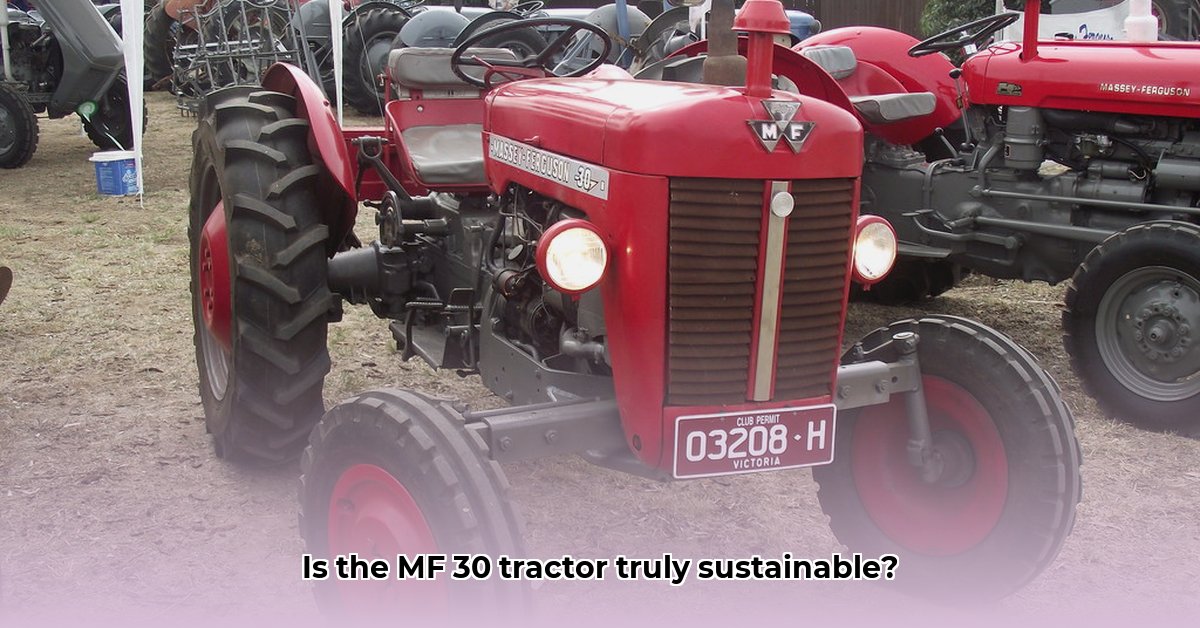
The Massey Ferguson MF 30, a stalwart of its era, offers a fascinating case study in agricultural mechanization and its intersection with sustainable practices. While not known for its modern features, its enduring simplicity and robust design warrant examination. This article explores its historical context, technical specifications, and relevance in contemporary sustainable agriculture, acknowledging the challenges of obtaining precise data for vintage machinery. For more on Massey Ferguson history, see this MF tractor history.
A Historical Overview: The MF 30's Era
The Massey Ferguson MF 30's production period remains somewhat uncertain, with sources suggesting a range from the early 1960s to the mid-1970s. This ambiguity highlights the difficulties inherent in researching older agricultural equipment. Regardless of the precise timeframe, the MF 30 emerged during a pivotal transition in farming: the widespread adoption of mechanized agriculture. Its design reflected the technological capabilities of its time—a durable, relatively simple machine emphasizing reliability and ease of repair. This was vital in an era before sophisticated farm maintenance infrastructure was ubiquitous.
Technical Specifications and Performance: A Comparative Look
The MF 30 typically used a Perkins engine, although variations in fuel type (gasoline or diesel) existed. However, precise horsepower and fuel consumption figures are inconsistent across available sources. This lack of readily accessible data underscores a common challenge in assessing the performance characteristics of vintage machinery. Compared to modern tractors, the MF 30's power output was considerably lower and its fuel efficiency significantly less. This disparity directly impacts its sustainability profile.
How crucial are these differences when comparing fuel efficiency? Modern tractors often achieve significantly better fuel economy thanks to advancements such as electronic fuel injection and optimized engine management systems. This translates to substantially lower greenhouse gas emissions.
Sustainability Assessment: A Nuanced Perspective
Assessing the MF 30's environmental impact requires careful consideration of multiple factors. While its fuel efficiency and emissions are likely lower than modern tractors, its simple design offers advantages. Fewer parts mean a smaller environmental footprint during manufacturing, and easier repairability reduces waste associated with frequent replacements. The extended lifespan potentially offsets some of the initial environmental cost. This raises a critical question: does the potential for longevity make up for its higher fuel consumption and emissions? A detailed life-cycle assessment would be necessary for a definitive answer.
Modern Relevance and Applications: Niche Uses and Cost-Benefit Analysis
Despite its age and limitations, the MF 30 remains relevant in certain contexts. Its robust construction and straightforward maintenance make it suitable for regions with limited access to specialized parts or skilled mechanics. Developing countries, where the initial cost of modern equipment can be prohibitive, might find the MF 30 a viable and more sustainable option, considering the total cost of ownership. Furthermore, for smaller-scale farming operations or niche agricultural tasks that don't demand high power outputs, the MF 30's simple functionality might be sufficient. A thorough cost-benefit analysis, considering both financial and environmental factors, is essential to determine its suitability for specific farming applications.
Conclusion: A Legacy of Simplicity and the Need for Further Research
The Massey Ferguson MF 30's legacy lies in its representation of a simpler era in agricultural mechanization. While it falls short of modern tractors in terms of power, efficiency, and emissions, its inherent simplicity and potential for durability offer valuable lessons. Its suitability depends critically on the specific circumstances of its use, requiring a careful cost-benefit analysis that considers both economic constraints and the environmental burden. Further research into original MF 30 documentation is crucial to resolve inconsistencies in available data and to provide a more complete understanding of its place in the ongoing evolution of sustainable farming practices. Ultimately, a holistic perspective, weighing factors beyond immediate fuel consumption, is required to evaluate this tractor's legacy.